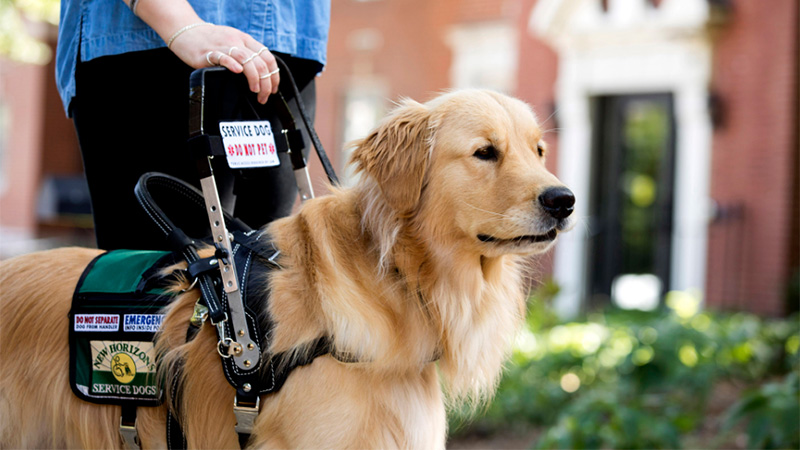Service Animals: How They Can Help You Live Your Best Life
Service animals can provide a number of great benefits for your life, no matter what medical issue you’re facing. Whether you’re dealing with a physical disability or a mental health disorder, a service dog can help you become more self-sufficient, less anxious and depressed and empower you with a new and expanded range of coping methods.

How a service can help improve your life, in particular, depends primarily on the condition or conditions that give you eligibility for a service dog. Service animals can help in a wide range of ways that you can break down into five distinct categories:
- Medical and Alert Tasks
- Brace and Mobility Tasks
- Guide and Visual Assistance Tasks
- Hearing Tasks
- Psychiatric Tasks
In the rest of this article, you’ll discover how gaining assistance from a registered service dog in each of these categories of service can help improve your life.
Medical and Alert Tasks
If you take medicine regularly, a service animal can help make sure you remember to take every dose by providing medication reminders and, even, retrieving your medication for you. A service animal can also alert you to dangers, approaching people or other situations, as well as alert others if you find yourself in need of greater assistance.
By taking your medicine as directed, those meds may serve you more effectively, so you can reap more of its intended benefits. With a service dog to alert you to both positive and negative stimuli in your environment, you can move about your home and the world more safely, independently and confidently.
Brace and Mobility Tasks
If you have difficulty moving, standing and sitting or maintaining balance and stability, a service animal can help. Whether by providing a physical brace for support or pulling you where you need to go in a wheelchair, a service animal can help you change positions, and locations safely.
With this kind of help, you can feel more secure taking on independent tasks around your home, running errands and maintaining an active social and recreational life. You may even be able to perform better at your job or, if you’re not yet employed, consider finding gainful employment. In this way, greater physical balance, stability and mobility can actually help you earn more money and, subsequently, increase your quality of living.
Guide and Visual Assistance Tasks
If you can’t see or have trouble seeing, a guide dog or visual assistance dog can, among other duties:
- Lead you along a known route
- Take you to a certain entrance or exit
- Alert you to obstacles in your path
- Help you locate a particular street or address
- Help you safely cross an intersection
- Find you an elevator or an empty seat
- Lead you to follow an individual, like a waiter
Hearing Tasks
Similarly, if you’re deaf or hearing-impaired, a service animal can help alert you to environmental sounds like a baby crying, knocking at the door or an alarm clock ringing. It can alert you to someone calling your name, a bus arriving, a dropped item, a person waiting for you to notice him or her, a car backing up toward you, a warning siren or overhead announcements, for just some examples.
Psychiatric Tasks
Not all disabilities are visible, or physical. Mental health disorders like anxiety, depression and PTSD can negatively impact your life every bit as much as any physical disability. Service dogs can help you manage a mental health disorder so that you can hopefully experience a reduced severity, frequency or duration of symptoms. Just some of the ways a service dog can help with psychiatric disorders include:
- Physical contact or therapeutic pressure, such as laying across your chest during a panic attack
- Using licking or nuzzling to ground you through loving physical contact
- Alerting you to an incident of strong emotions or signs of a symptomatic episode beginning
- Retrieving your self-care kit
- Waking you up from a nightmare
- Interrupting a flashback
- Searching the house to provide you a sense of security, safety and comfort
- Acting as a “reality check” against potential hallucinations
Other Types of Service Dog Tasks
Regardless of your condition, there are many other ways a service dog can help make your life the best it can be. Some of them are potentially life-saving. For example, he or she can burrow beneath your legs while you’re unconscious in order to elevate your blood pressure, nudge you into the recovery position or lay across your chest to help clear your lungs. Others are more life-enhancing, such as by providing you comfort, grounding and affection that you can literally take with you wherever you go.



